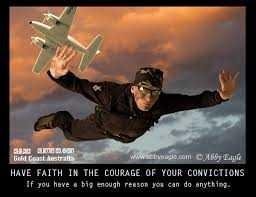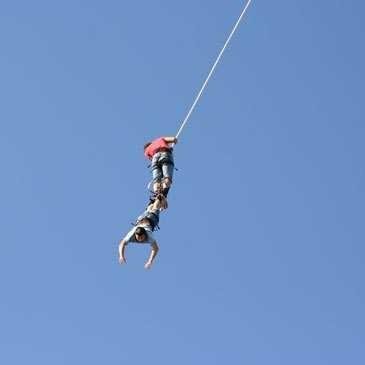Perhaps the greatest challenge that you will ever face in life is the conquest of fear and the development of the habit of courage. Winston Churchill once wrote, “Courage is rightly considered the foremost of virtues, for upon it, all others depend.” Fear is, and always has been, the greatest enemy of mankind. When Franklin D. Roosevelt said, “The only thing we have to fear is fear itself,” he was saying that the emotion of fear, rather than the reality of what we fear, is the cause of the associated anxiety, stress, and unhappiness. When we develop the habit of courage and unshakable self-confidence, a whole new world of possibilities opens up to us. Just think: What would you dare to dream, be, or do if you were not afraid of anything in the whole world?
Fortunately, the habit of courage can be learned, just as any other skill is learned. To do so, we need to go to work systematically to diminish and eradicate our fears, while simultaneously building the kind of courage that will enable us to deal fearlessly with the inevitable ups and downs of life. “If I were asked to give what I considered the single most useful bit of advice for all humanity, it would be this: Expect trouble as an inevitable part of life, and when it comes, hold your head high. Look it squarely in the eye and say, ‘I will be bigger than you. You cannot defeat me.’ ” This is the kind of attitude that leads to victory.

The starting point in overcoming fear and developing courage is to look at the factors that predispose us toward fear: The root source of fear is childhood conditioning that caused us to experience two types of fear: the fear of failure, which causes us to think, I can’t, I can’t, I can’t; and the fear of rejection, which causes us to think, I have to, I have to, I have to.
Based on those fears, we become preoccupied with the idea of losing our money, our time, our emotional investment in a relationship. We become hypersensitive to the opinions and possible criticisms of others, sometimes to the point where we are afraid to do anything that anyone else might disapprove of. Our fears tend to paralyze us, holding us back from taking constructive action in the direction of our dreams and goals. We hesitate, we become indecisive, and we procrastinate; we make excuses and find reasons not to move ahead. And finally, we feel frustrated, caught in the double bind of “I have to, but I can’t” and “I can’t, but I have to.”
Fear is also caused by ignorance. When we have limited information, we tend to be tense and insecure about the outcome of our actions. Ignorance causes us to fear change, to fear the unknown, and to avoid trying anything new or different. But the reverse is also true. The very act of gathering more and more information about a particular subject causes us to be more courageous and confident in that area. There are parts of our life when we have no fear at all because we feel knowledgeable and capable of handling whatever happens. Once you’ve recognized the factors that can cause fear, the second step in overcoming it is to sit down and take the time to objectively define and analyze your own fears. At the top of a sheet of paper, write down the question, “What am I afraid of?”

Now, before you begin, here’s an important point to remember: All intelligent people are afraid of something. It is normal and natural to be concerned about your physical, emotional, and financial survival. The courageous person is not a person who is unafraid. As Mark Twain said, “Courage is resistance to fear, mastery of fear — not absence of fear.” It is not whether or not you are afraid. We are all afraid. The question is, How do you deal with the fear? The courageous person is simply one who goes forward in spite of the fear. And here’s something else I’ve learned: When you confront your fears and move toward what you are afraid of, your fears diminish and your self-esteem and self-confidence increase. However, when you avoid the things you fear, your fears grow until they begin to control every aspect of your life. And as your fears increase, your self-esteem, your self-confidence, and your self-respect diminish accordingly.
Begin your list of fears by writing down everything, major and minor, over which you experience anxiety. The most common fears, of course, are those related to failure and rejection, but be more specific than that. Some people, compelled by the fear of failure, invest an enormous amount of energy justifying or covering up their mistakes. And some people, compelled by the fear of rejection, are so obsessed with how they appear to others that they seem to have no ability at all to take independent action. Until they are absolutely certain that someone else will approve, they refrain from doing anything. Once you have made a list of every fear that you think may be affecting your thinking and behavior, organize the items in order of importance. Which fear do you feel has the greatest impact on your thinking or holds you back more than any other? Which fear would be number two? And so on.

Source
Plagiarism is the copying & pasting of others work without giving credit to the original author or artist. Plagiarized posts are considered spam.
Spam is discouraged by the community, and may result in action from the cheetah bot.
More information and tips on sharing content.
If you believe this comment is in error, please contact us in #disputes on Discord
Downvoting a post can decrease pending rewards and make it less visible. Common reasons:
Submit